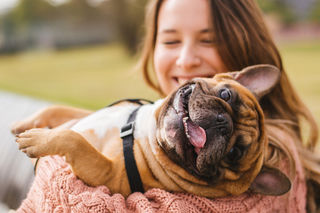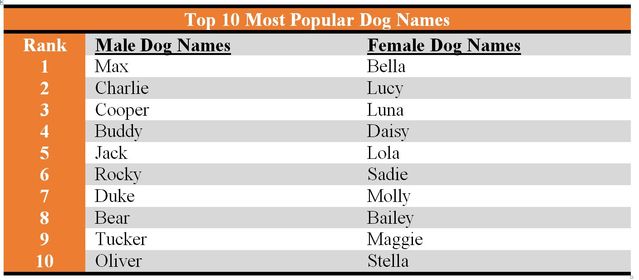Attention
How We Choose Our Dogs' Names
A new survey finds some surprising trends in popular dog names.
Posted December 12, 2018 Reviewed by Lybi Ma

Fido, Rover, and Lassie are all instantaneously recognized by English speakers as dog names. The interesting thing is that virtually nobody names their dog Fido, Rover, or Lassie, according to the most recent statistics on dog names.
A new tabulation of popular dog names has just been put out by Rover.com, which advertises itself as the world's largest network of pet sitters and dog walkers. The site annually combs through its database of more than 1 million dogs to determine which dog names are the most popular. This year, they also surveyed their clients to see what may have influenced their choice of the name for their pet.
There is a lot of evidence indicating that people tend to view their dogs as family members. (Click here for more.) Therefore, it should not be surprising that the most popular dog names are also common human names or nicknames. You can see this if you look at the top 10 names for male and female dogs where only one ("Bear") is not a common name or nickname for a person.

The idea that we view our dogs as family members, and also as children in some respects, is further emphasized by the fact that nearly half of these top names are also found in the top 100 human baby names for this year (Max, Charlie, Cooper, Jack, Oliver, Bella, Lucy, Luna, and Stella).
In the Rover.com survey, it became clear that special people are often the inspiration for a dog's name. For example, 12 percent of dog owners say that they have named their dog after a famous or historical person. For example, this was a big year for the British royal family in the press, with royal babies, princely marriages and that sort of thing. The top five royal dog names were Sophie, George, Prince, Charlotte, and Harry. In fact, Harry and Meghan both showed an astonishing increase in popularity, by 133 percent and 129 percent respectively.
Popular culture plays a strong role in our canine naming practices, since 33 percent of dog owners say that they have named their dog after a character in a TV show, video game, movie, or book. One surprise here is that the characters that people choose from these sources as dog names are not always the good guys or heroes. The number of dogs named after popular villains has trended up by 18 percent this year, and these include such movie bad guys as Loki, Bane, Sid, Anakin, and Lex. It is also likely that the release of the latest movie version of Stephen King's It accounts for the fact that the number of dogs named Pennywise (after the evil clown) increased by 500 percent this year.
However, individuals don't have to be famous to have a dog named after them, since 10 percent of dog owners named their dog after someone they know personally. People with toy-size dogs are the owners most likely to name their dogs after someone that they actually know. Thus, it is not surprising that more than a third of the respondents have met a dog who shares their own human name (and this is equally likely for males and females).
People are not always the only inspiration for dog names. Approximately 5 percent of dog owners named their dog after a city or geographic location, and 12 percent have named their dog after an animal, plant, or some natural element. An additional 4 percent have named their dog after a brand.
What I found surprising was the number of dogs that were named after foods. Food-themed names are on the rise and are up 12 percent this year. They include Biscuit, Cinnamon, Muffin, Waffles, and Beans. However, if you scan the list you will also find increasing popularity for names like Couscous, Crisco, Cheetos, Pasta, and Ramen.
Names based on alcoholic beverages are also up this year, with a significant 17 percent rise in monikers like Whiskey, Porter, Guinness, and Brandy.
Once a dog has a name, it is not necessarily its permanent label, since 38 percent of dog owners end up changing their dog's name. This is particularly understandable if we are dealing with an adopted dog which has a name that its new owner is not quite comfortable with. That is what happened to me: I adopted an older Cavalier King Charles Spaniel after his owner suffered from some medical problems and couldn’t keep all of her dogs. He was a handsome dog who came with the name “Banshee.” I tried to use that name for him when I got home, but my professorial soul had great difficulty calling a male Scottish dog with the name of a female Irish ghost. I did ask Katie why she had named him Banshee, and she had a perfectly sensible reason. When he was very young, he used to make a sort of “woo-woo” sound. When she lived in England, and the wind would make a similar sound as it blew past the roof of her house, her family would refer to it as a “banshee wind.” She never bothered to look into the origin of that term, and it just seemed appropriate for this noisy pup. However, I never got used to it, and ultimately renamed him “Bam Bam” after the little boy in the cartoon series The Flintstones. I felt that the first syllable of his old and new name sounded sufficiently similar, and was apparently correct since he responded to his new name the very first time that I used it, and happily responded to it for the rest of his life.
However, even if the dog has a name which his family is comfortable with, that is usually not the end of the labeling process. The survey showed that 81 percent of pet parents give their dogs nicknames. Actually, the majority of dog owners usually have three or more nicknames that they use when interacting with their dog. (My older dog, Ripley, has to put up with the nicknames of Fur Face, Old Man, and Broom Tail, depending upon which family member is talking to him. He has learned to respond to all of them to a greater or lesser extent.)
As a psychologist, I must admit that I have always had a fascination with why people chose specific names for their dogs (or their children), and occasionally the reasons are surprising and unexpected. Such was the case when I recently encountered a woman who had a young Nova Scotia Duck Tolling Retriever. As I bent down to pet the dog I asked her what his name was. She replied "Gummy." When I asked her if there was any particular reason that she chose the name Gummy, she went on to explain: "His name is sort of a joke, since he is a reddish color, and my husband is a dentist."
Copyright SC Psychological Enterprises Ltd. May not be reprinted or reposted without permission
Facebook Image: Rob Hainer/Shutterstock




